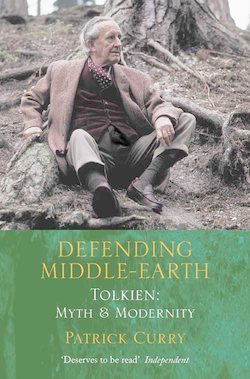Читать книгу Defending Middle-earth: Tolkien: Myth and Modernity - Patrick Curry - Страница 13
· 2 · THE SHIRE: CULTURE, SOCIETY AND POLITICS
ОглавлениеIt is as neighbours, full of ineradicable prejudices, that we must love each other, and not as fortuitously ‘separated brethren.’
Hobbits, according to Tolkien, were more frequent ‘long ago in the quiet of the world …’ They ‘love peace and quiet and good tilled earth: a well-ordered and well-farmed countryside was their favourite haunt. They do not and did not understand or like machines more complicated than a forge-bellows, a water-mill, or a hand-loom … Their faces were as a rule good-natured rather than beautiful, broad, bright-eyed, red-cheeked, with mouths apt to laughter, and to eating and drinking.’ They thought of themselves as ‘plain quiet folk’ with ‘no use for adventures. Nasty disturbing uncomfortable things! Make you late for dinner!’ ‘Nonetheless,’ their chronicler notes, ‘ease and peace had left this people still curiously tough. They were, if it came to it, difficult to daunt or to kill …’ In other words, they manifested ‘the notorious Anglo-hobbitic inability to know when they’re beaten.’
Hobbits were also inclined ‘to joke about serious things,’ and ‘say less than they mean.’ Indeed, they ‘will sit on the edge of ruin and discuss the pleasures of the table, or the small doings of their fathers, grandfathers, and great-grandfathers, and remoter cousins to the ninth degree, if you encourage them with undue patience.’ Similarly, they preferred speeches that were ‘short and obvious,’ and ‘liked to have books filled with things that they already knew, set out fair and square with no contradictions.’ They were ‘a bit suspicious … of anything out of the way – uncanny, if you understand me.’ It wasn’t difficult to acquire a reputation for peculiarity in the Shire.
But as Tolkien notes, in addition to their wealth ‘Bilbo and Frodo Baggins were as bachelors very exceptional, as they were also in many other ways, such as their friendship with Elves.’ The nephew of ‘mad Baggins,’ as he eventually became known, Frodo was something of an aesthete and intellectual, who, ‘to the amazement of sensible folk … was sometimes seen far from home walking in the hills and woods under the starlight.’ None of this was usual among their peers, and Sam the gardener, although recently and exceptionally lettered, was a more typical hobbit than his fellow Companions – or as Tolkien put it, ‘the genuine hobbit.’
Like some readers, Tolkien himself sometimes found Sam, as he wrote:
very ‘trying.’ He is a more representative hobbit than any others that we have to see much of; and he has consequently a stronger ingredient of that quality which even some hobbits found at times hard to bear: a vulgarity – by which I do not mean a mere ‘down-to-earthiness’ – a mental myopia which is proud of itself, a smugness (in varying degrees) and cocksureness, and a readiness to measure and sum up all things from a limited experience, largely enshrined in sententious traditional ‘wisdom.’ … Imagine Sam without his education by Bilbo and his fascination with things Elvish!
Even with this kind of conservative peer pressure, however, your behaviour had to be extreme to land you in any real trouble, for the Shire at this time had hardly any government: ‘Families for the most part managed their own affairs. … The only real official in the Shire at this date was the Mayor of Michel Delving,’ and ‘almost his only duty was to preside at banquets …’ Otherwise there were only hereditary heads of clans, plus a Postmaster and First Shirriff – the latter less for Inside Work than ‘to see that Outsiders of any kind, great or small, did not make themselves a nuisance.’
